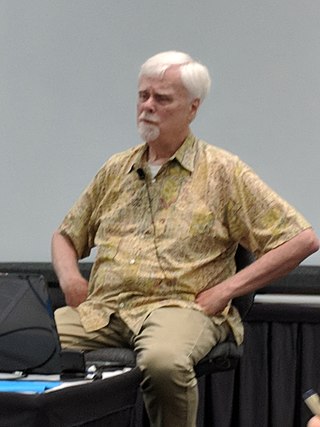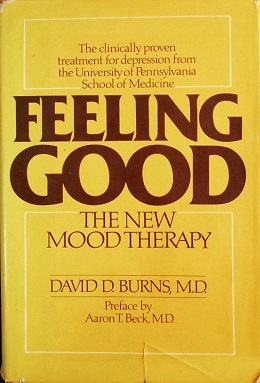
Cognitive behavioral therapy (CBT) is a psycho-social intervention that aims to reduce symptoms of various mental health conditions, primarily depression and anxiety disorders. CBT focuses on challenging and changing cognitive distortions and their associated behaviors to improve emotional regulation and develop personal coping strategies that target solving current problems. Though it was originally designed to treat depression, its uses have been expanded to include the treatment of many mental health conditions, including anxiety, substance use disorders, marital problems, and eating disorders. CBT includes a number of cognitive or behavioral psychotherapies that treat defined psychopathologies using evidence-based techniques and strategies.

Albert Ellis was an American psychologist and psychotherapist who founded rational emotive behavior therapy (REBT). He held MA and PhD degrees in clinical psychology from Columbia University, and was certified by the American Board of Professional Psychology (ABPP). He also founded, and was the President of, the New York City-based Albert Ellis Institute. He is generally considered to be one of the originators of the cognitive revolutionary paradigm shift in psychotherapy and an early proponent and developer of cognitive-behavioral therapies.

Aaron Temkin Beck was an American psychiatrist who was a professor in the department of psychiatry at the University of Pennsylvania. He is regarded as the father of cognitive therapy and cognitive behavioral therapy (CBT). His pioneering methods are widely used in the treatment of clinical depression and various anxiety disorders. Beck also developed self-report measures for depression and anxiety, notably the Beck Depression Inventory (BDI), which became one of the most widely used instruments for measuring the severity of depression. In 1994 he and his daughter, psychologist Judith S. Beck, founded the nonprofit Beck Institute for Cognitive Behavior Therapy, which provides CBT treatment and training, as well as research. Beck served as President Emeritus of the organization up until his death.

Cognitive restructuring (CR) is a psychotherapeutic process of learning to identify and dispute irrational or maladaptive thoughts known as cognitive distortions, such as all-or-nothing thinking (splitting), magical thinking, overgeneralization, magnification, and emotional reasoning, which are commonly associated with many mental health disorders. CR employs many strategies, such as Socratic questioning, thought recording, and guided imagery, and is used in many types of therapies, including cognitive behavioral therapy (CBT) and rational emotive behaviour therapy (REBT). A number of studies demonstrate considerable efficacy in using CR-based therapies.
Eye movement desensitization and reprocessing (EMDR) is a form of psychotherapy devised by Francine Shapiro in the 1980s that was originally designed to alleviate the distress associated with traumatic memories such as post-traumatic stress disorder (PTSD). EMDR involves focusing on traumatic memories in a manner similar to exposure therapy while engaging in side-to-side eye movements. These eye movements have been criticized as having no scientific basis. The therapy has been aggressively promoted by its founder and other practitioners for the treatment of PTSD, employing untestable hypotheses to explain negative results in controlled studies. EMDR has been characterized as a pseudoscientific purple hat therapy.

Beck's cognitive triad, also known as the negative triad, is a cognitive-therapeutic view of the three key elements of a person's belief system present in depression. It was proposed by Aaron Beck in 1967. The triad forms part of his cognitive theory of depression and the concept is used as part of CBT, particularly in Beck's "Treatment of Negative Automatic Thoughts" (TNAT) approach.
Acceptance and commitment therapy is a form of psychotherapy, as well as a branch of clinical behavior analysis. It is an empirically based psychological intervention that uses acceptance and mindfulness strategies along with commitment and behavior-change strategies to increase psychological flexibility.

David D. Burns is an American psychiatrist and adjunct professor emeritus in the Department of Psychiatry and Behavioral Sciences at the Stanford University School of Medicine. He is the author of bestselling books such as Feeling Good: The New Mood Therapy, The Feeling Good Handbook and Feeling Great: The Revolutionary New Treatment for Depression and Anxiety.
Daniel David is a Romanian academic. He is "Aaron T. Beck" professor of Clinical Psychology and Psychotherapy at the Babeș-Bolyai University, Cluj-Napoca. He was the head of the Department of Clinical Psychology and Psychotherapy of the Babeş-Bolyai University between 2007 and 2012. Daniel David is also an adjunct professor at Icahn School of Medicine at Mount Sinai and is the head of the Research Program at Albert Ellis Institute in New York.
Marsha M. Linehan is an American psychologist and author. She is the creator of dialectical behavior therapy (DBT), a type of psychotherapy that combines cognitive restructuring with acceptance, mindfulness, and shaping.
Cognitive therapy (CT) is a type of psychotherapy developed by American psychiatrist Aaron T. Beck. CT is one therapeutic approach within the larger group of cognitive behavioral therapies (CBT) and was first expounded by Beck in the 1960s. Cognitive therapy is based on the cognitive model, which states that thoughts, feelings and behavior are all connected, and that individuals can move toward overcoming difficulties and meeting their goals by identifying and changing unhelpful or inaccurate thinking, problematic behavior, and distressing emotional responses. This involves the individual working with the therapist to develop skills for testing and changing beliefs, identifying distorted thinking, relating to others in different ways, and changing behaviors. A cognitive case conceptualization is developed by the cognitive therapist as a guide to understand the individual's internal reality, select appropriate interventions and identify areas of distress.
Judith S. Beck is an American psychologist who is best known for her work in cognitive therapy and cognitive behavioral therapy. Her father is Aaron Beck, the founder of cognitive therapy, with whom she has worked on many occasions. She received her doctoral degree from the University of Pennsylvania in 1982.

Feeling Good: The New Mood Therapy is a book written by David D. Burns, first published in 1980, that popularized cognitive behavioral therapy (CBT).

Gerhard Andersson is a Swedish psychologist, psychotherapist and Professor of clinical psychology at Linköping University. He was previously affiliated researcher at Karolinska Institutet. He was a co-recipient of the Nordic Medical Prize in 2014.
David F. Tolin, Ph.D. is an American clinical psychologist.
Occupational therapy is used to manage the issues caused by seasonal affective disorder (SAD). Occupational therapists assist with the management of SAD through the incorporation of a variety of healthcare disciplines into therapeutic practice. Potential patients with SAD are assessed, treated, and evaluated primarily using treatments such as drug therapies, light therapies, and psychological therapies. Therapists are often involved in designing an individualised treatment plan that most effectively meets the client's goals and needs around their responsiveness to a variety of treatments.
Trauma focused cognitive behavioral therapy (TF-CBT) is an evidence-based psychotherapy or counselling that aims at addressing the needs of children and adolescents with post traumatic stress disorder (PTSD) and other difficulties related to traumatic life events. This treatment was developed and proposed by Drs. Anthony Mannarino, Judith Cohen, and Esther Deblinger in 2006. The goal of TF-CBT is to provide psychoeducation to both the child and non-offending caregivers, then help them identify, cope, and re-regulate maladaptive emotions, thoughts, and behaviors. Research has shown TF-CBT to be effective in treating childhood PTSD and with children who have experienced or witnessed traumatic events, including but not limited to physical or sexual victimization, child maltreatment, domestic violence, community violence, accidents, natural disasters, and war.
Stefan G. Hofmann is a German-born clinical psychologist. He is the Alexander von Humboldt Professor and recipient of the LOEWE Spitzenprofessur for Translational Clinical Psychology at the Philipps University of Marburg in Germany and Professor for Psychology at the Department of Psychological and Brain Sciences at Boston University examining Cognitive Behavioral Therapy, especially for anxiety disorders Since 2012, he has been editor in chief of the journal Cognitive Therapy and Research
Donald H. Meichenbaum is an American psychologist and Distinguished Professor Emeritus of Psychology at the University of Waterloo, Ontario. He is a research director of the Melissa Institute for Violence Prevention and Treatment at the University of Miami. Meichenbaum is known for his research and publications on psychotherapy, and contributed to the development of the technique of cognitive-behavioural therapy (CBT). In 1982, a survey of 800 members of the American Psychological Association voted Meichenbaum the tenth most influential psychotherapist of the 20th century. At the time of his retirement from the University of Waterloo in 1998, Meichenbaum was the most-cited psychology researcher at a Canadian university.

Farooq Naeem FRCPsych, Ph.D. is known in global mental health for his pioneering work on cultural adaptation of cognitive behaviour therapy. He is also the founder of PACT. He is currently a professor of psychiatry at the University of Toronto, Toronto, Canada.









